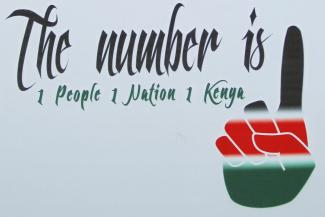Fundamentalist violence
Disowned by faith leaders
By Agnes Abuom

The Kenyan nation is still traumatised and shaken by the Westgate Mall terrorist attack. The families of the people killed in the terrorist acts of the gunmen are slowly coming to terms with the deaths of their loved ones. The attack has left at least 69 people dead. It is envisaged that by the time the mall is finally cleared off, and the authorities have access to all its nooks and crannies, the causality figure could rise.
People are in shock because they have either lost their loved ones and livelihoods, sustained injuries, saw their friends and loved ones get injured or killed, or witnessed such heinous terrorist acts on innocent and powerless individuals, including women and children. The events have heightened a sense of insecurity amongst Kenyans, even though the government vows to hunt down and punish those responsible for the atrocities.
The terrorists have associated their acts with Islam, but Muslim leaders have completely disowned them. Since the 1990s, extremists across Africa – including al-Qaeda in the Islamic Maghreb or Boko Haram in Nigeria – have based their acts on Islamist fundamentalism. Al-Shabab in Somalia and Kenya is not different. However, religious leaders from all faiths, including Islam, have come together to preach peace, and have advised community members to do the same. There were joint prayers for the victims on Tuesday, 1 October 2013, at the Kenya International Convection Center (KICC).
One response to the Westgate attack was the slogan “we are one”. It is very popular today, and, so far, the Somali minority in Kenya is not excluded from this sense of unity. It is true that Al-Shabab is based in Somalia and has claimed responsibility for the attack. However, the identity of the attackers remained unknown during the siege. Moreover, people understand that Al-Shabab is an international network with members all over the world. Three weeks after the attack, intelligence reports about the involvement of a British woman and two or three American citizens had not been confirmed however.
In the past, ethnic communities did experience suspicions and even hatred after episodes of violence in Kenya, but not this time. It certainly helped that many journalists, politicians and religious leaders of Somali origin condemned the heinous acts in public.
The relevant government authorities did a commendable job in responding to and tackling the situation. The police officers and the military personnel rushed to the scene and risked their own lives to save hundreds of civilian hostages. Photos taken during the operation show officers both in uniform and in plain clothes doing their best to contain the situation. Six members of the security forces paid the ultimate price and lost their lives at Westgate.
It is disconcerting, however, that some officers seem to have looted goods from the shopping mall. Moreover, we still do not have a detailed picture of the events even three weeks later. Perhaps some terrorists were allowed to escape. The government is still struggling to come up with a detailed and coherent assessment of what happened.
It is believed that the roots of the Westgate attack lie in Kenya’s decision to send troops to Somalia in October 2011. The Kenyan government basically ordered its armed forces to intervene in a sense of self-defence, fearing for our nation’s important tourism and shipping industries. The Kenyan troops were dispatched across the border with the mandate to hunt down and destroy Al-Shabab – and this Islamist militant group has since been promising a massive, bloody revenge. Before Westgate, Kenya had already suffered a series of fundamentalist attacks. The recent events, however, have made Kenyans feel more than before that we belong to one nation.
Agnes Abuom heads the development consultancy TAABCO in Nairobi and is a former Africa president of the World Council of Churches. taabco@taabco.org









